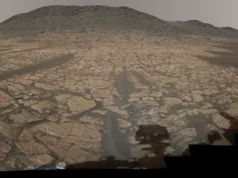
July 20, 2019 marks the 50th anniversary of Apollo 11, the first time humans walked on the Moon. Coming this summer, NASA Explorers: Apollo is a commemorative audio series that examines the Moon’s cultural and scientific influence over the last half century, while also peering into the future of planetary exploration. Listeners will meet a Moon detective, tour a lab for space rocks and hear from scientists whose lives and work have been shaped by the Apollo program.
As a part of this series, NASA invites you to contribute to an oral history project celebrating giant leaps and exploration of all kinds. You can help NASA tell the Apollo story by sharing your own perspective on lunar exploration, or by interviewing a loved one who lived during the Apollo era. NASA will select some submissions to feature in the audio series, on its website and/or social media.
Email your audio recording to apollostories@mail.nasa.gov
- Browse our list of suggested questions and see what inspires you, or think of your own.
- Record audio of yourself or interview a loved one who remembers the Apollo era (1960-1972).
- Email your story to NASA!
How to record and submit your story
The deadline to submit your story to the mini oral history project is December 31, 2019. However, submissions received before June 14, 2019, will have the best chance at being featured within the audio series.
- Open the voice recording app on your mobile device. If you don’t have one, there are several free options you can download from your preferred app store.
- Record your story or interview. Try to follow the recording tips and guidelines below.
- Email your audio file to apollostories@mail.nasa.gov. In the text of your email, include your full name, your hometown and state. If you interviewed someone, please include their full name and hometown as well. Include any information you think helps give context to your story. (“I interviewed my grandma. She was 15 years old when the astronauts landed on the Moon …”).
- Keep an eye on your inbox. You’ll receive a thank-you email from us and we may follow up to get more detail or clarify something in your story.
Recording tips and guidelines
- Try to keep your answers to each question under 120 seconds. Shorter stories will have a greater chance of being featured within NASA’s Apollo audio series, but longer stories may still be featured on nasa.gov or social media as a part of the oral history project.
- Start the recording by introducing yourself and telling us where you’re from. If you’re interviewing someone, do the same for them. We want to give you credit for the story!
- Hold the recording device at least 6 inches from your face, or simply place it on a table in front of you or between you and the person you’re interviewing.
- Allow for a natural pause between questions and answers.
- Preferred audio file formats are .mp3, .mp4, .m4a or .wav.
Suggested questions to answer yourself or ask your interviewee
- What does exploration mean to you?
- What do you think it would be like to see humans walk on the Moon again?
- When you think of the Moon, what comes to mind?
- What do you want to know about the Moon?
If you remember the Apollo program …
- Where were you when humans walked on the Moon for the first time? Describe who you were with, what you were thinking, the atmosphere and how you were feeling.
- What was your life like in 1969?
- Do you remember learning about space in school? If so, what do you remember?
Apollo Oral History Project Terms and Conditions
Disclaimer
The information contained in South Florida Reporter is for general information purposes only.
The South Florida Reporter assumes no responsibility for errors or omissions in the contents of the Service.
In no event shall the South Florida Reporter be liable for any special, direct, indirect, consequential, or incidental damages or any damages whatsoever, whether in an action of contract, negligence or other tort, arising out of or in connection with the use of the Service or the contents of the Service. The Company reserves the right to make additions, deletions, or modifications to the contents of the Service at any time without prior notice.
The Company does not warrant that the Service is free of viruses or other harmful components












